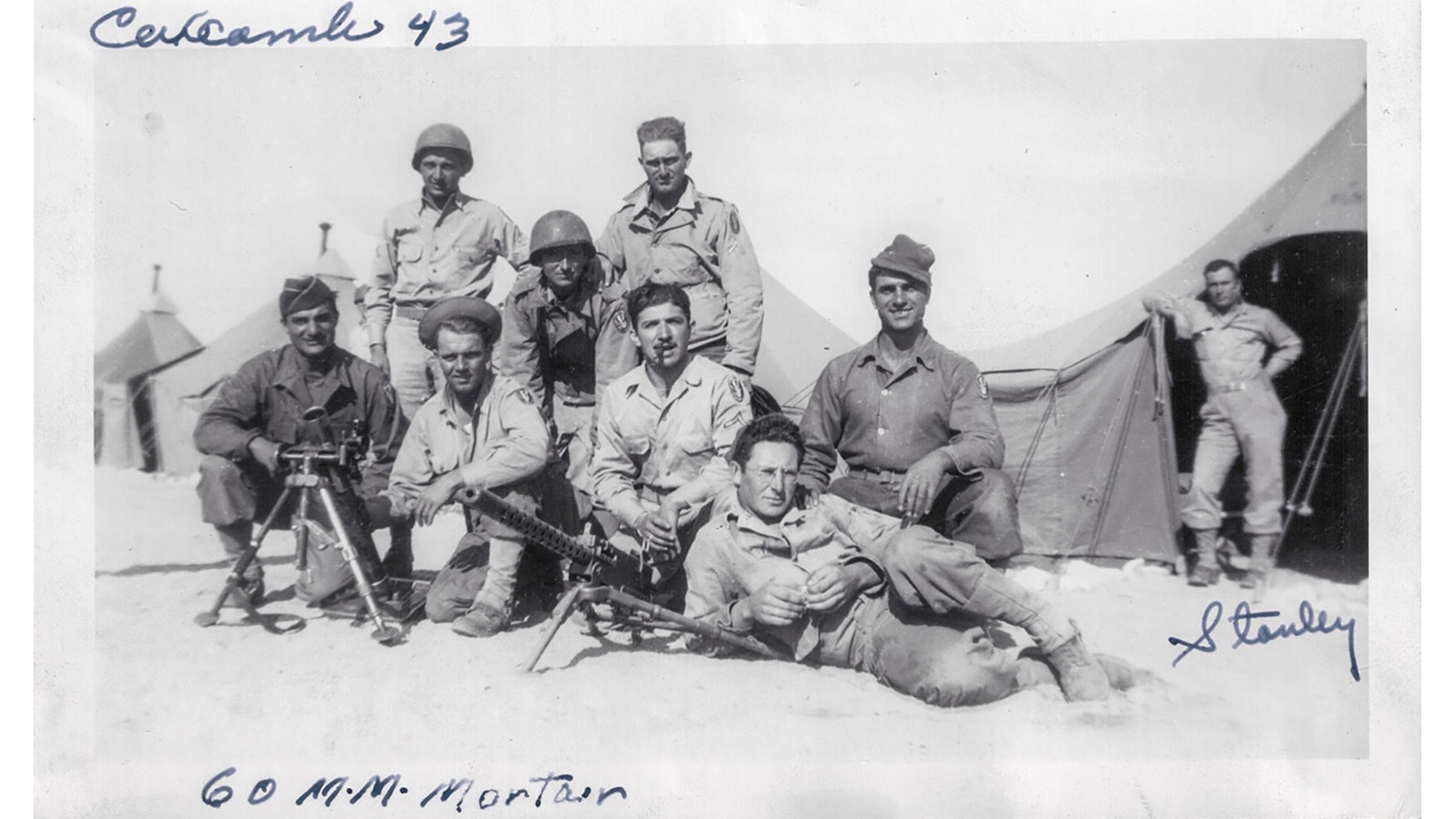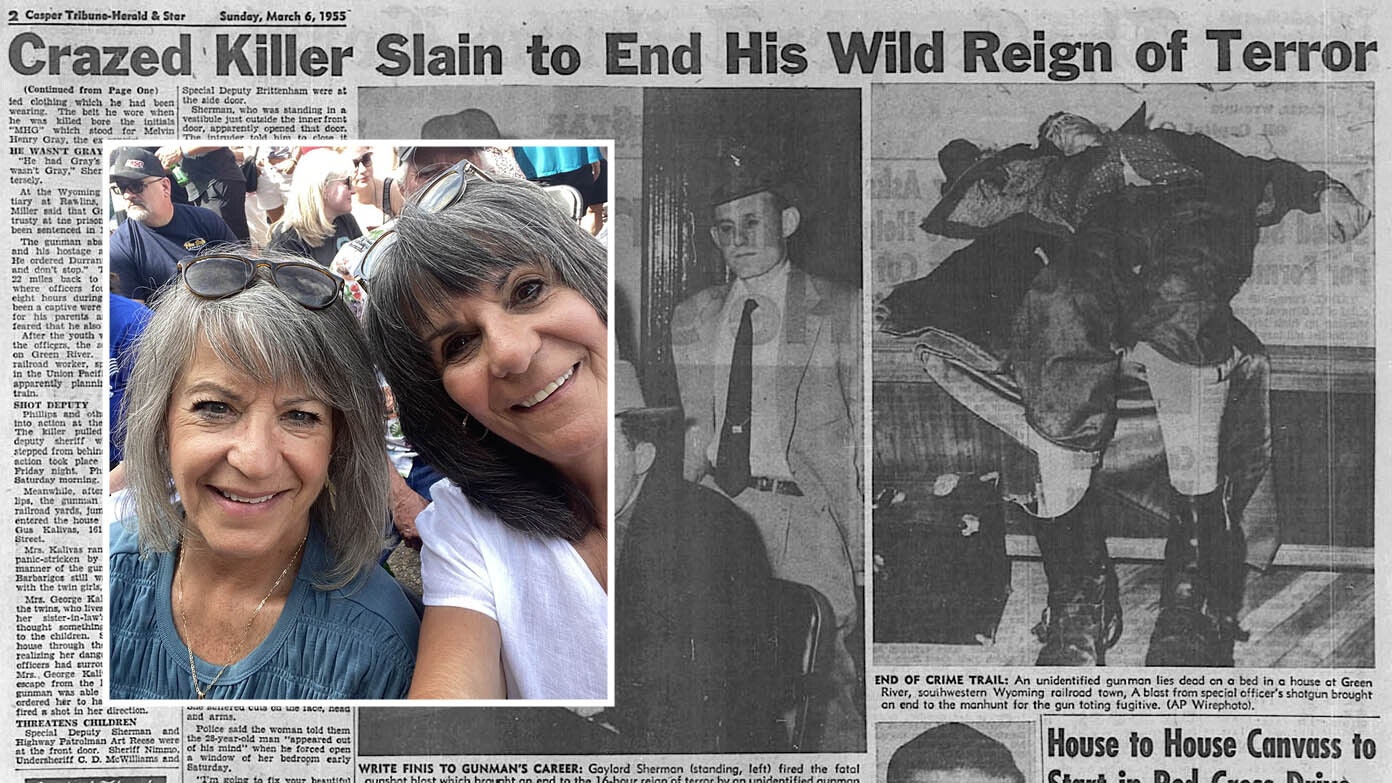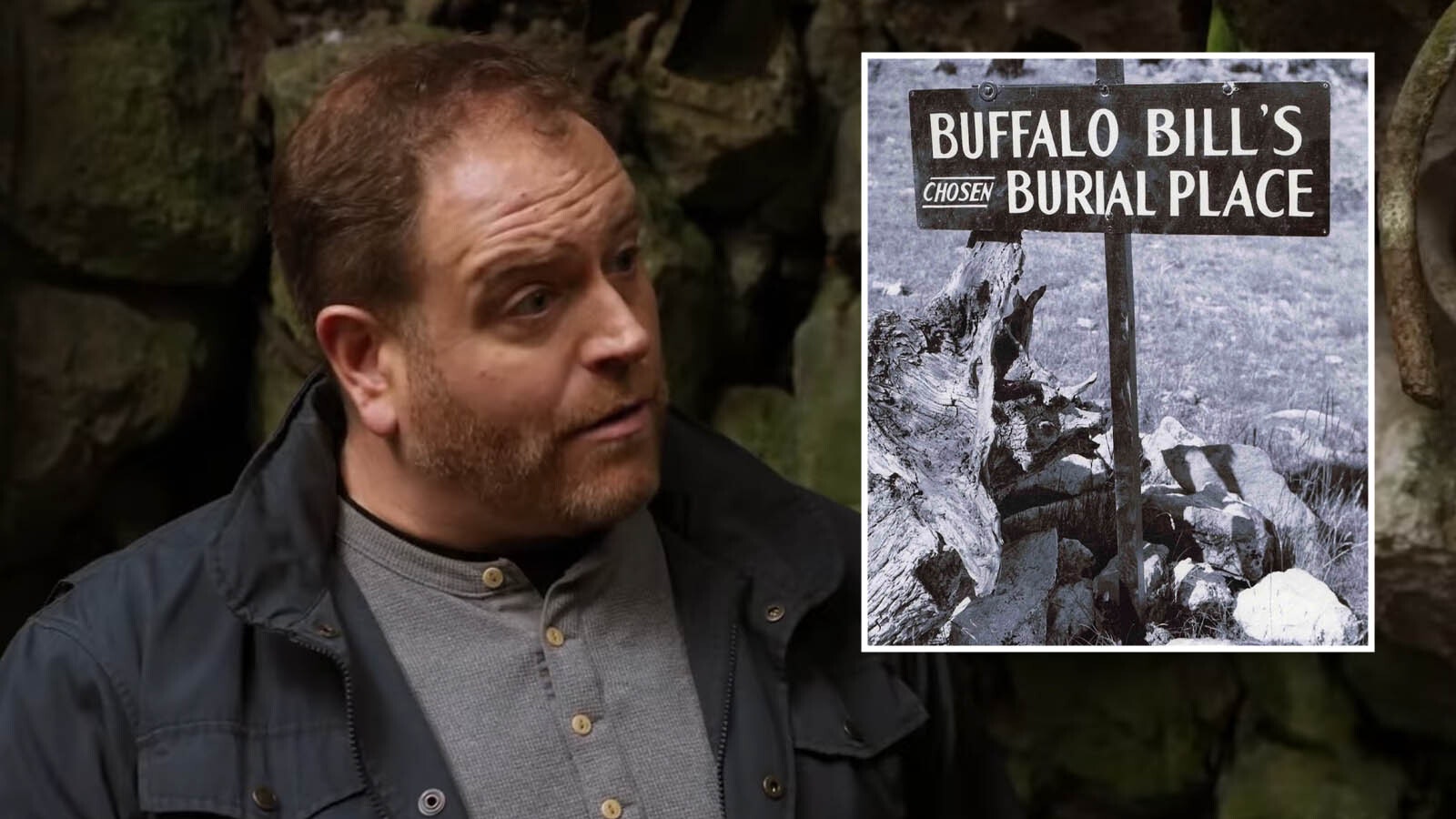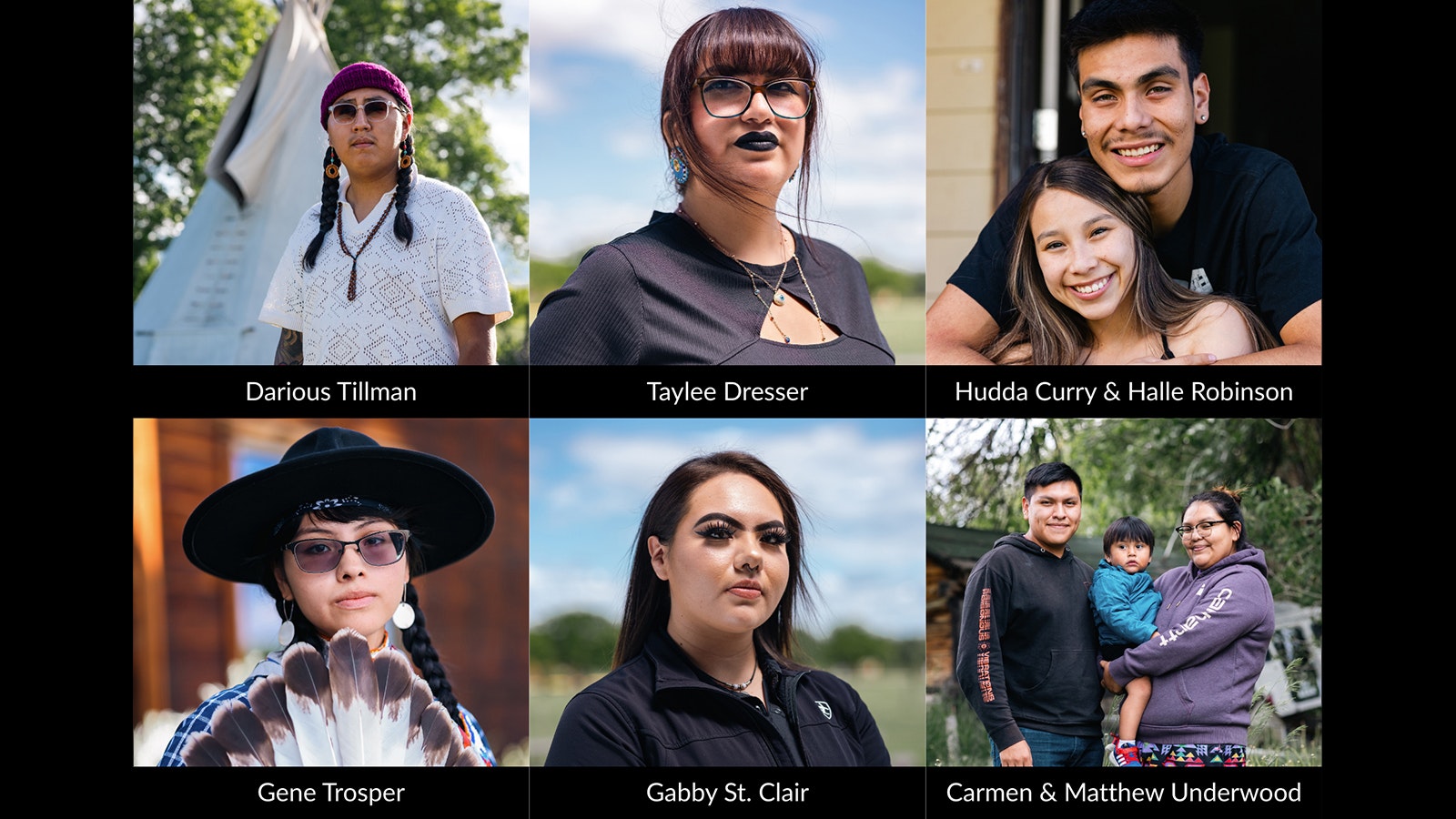The story begins on a porch in Rock Springs, where Mark Pedri and his grandfather Silvio Pedri spent many nights listening to the wind.
For 10 years of his childhood Pedri spent every day with Silvio, who he described as a quiet and simple man that focused his whole life on work and family. Then 10 years after his grandfather’s death, Pedri uncovered an archive of documents and photos detailing his grandfather’s horrifying journey as an American POW during World War II.
Pedri’s journey to retrace Silvio’s footsteps across Germany on bike in an effort to better understand the man who raised him, led to the documentary “Dear Sirs.”
“The movie is taking all of those expressions that we found – the letters, the photos, and trying to put them into a narrative to make sense of it, (and) create that story that he was telling,” Pedri said. “He just never outwardly told it to me when he was alive.”
The documentary has been shown at various film festivals and on PBS since it was released in late 2021. And just last month “Dear Sirs” won three Heartland Emmy awards.
“It was really quite a celebration of Mark's creative force on the film and as an artist,” producer and Pedri’s wife Carrie McCarthy said.
Discovering The Mystery
In November 1944, Sgt. Silvio Pedri of the 95th Infantry was sent on a mission to cross the Moselle River near Metz, France.
The goal was to secure the opposite bank and create a diversion so that a larger unit could build a bridge to bring in the heavy artillery and take the city from the German army.
Things didn’t go according to plan, though, and following a grueling battle in which he lost most of his closest friends, Silvio was injured and taken prisoner.
While Pedri knew Silvio served in World War II and had been a prisoner, he knew none of the details.
So it came as quite a surprise when Pedri found several photos, documents and letters that detailed Silvio’s experience of being captured and then marched from camp to camp across Germany as a prisoner of war.
“Here is this person that you thought you knew so much about and based so much of your life on, and you’re seeing a whole new side of that person that you never met,” Pedri said. “Each new thing on a map in his handwriting with circles of locations, names of people, letters, photos, all of those things were like a new window into this person that was so different from the person that I knew.”
After discovering the information in late 2017, Pedri and McCarthy quit their jobs in Los Angeles and moved into his grandfather’s house in Rock Springs early the next year, spending about six months there researching every aspect of his story.
Pedri eventually decided the only way he could come close to fully understanding his grandfather was to retrace his route and let the places reveal a side of him that Pedri never had the chance to meet. McCarthy joined him on the trip.
Wanting to capture the feelings from Silvio’s letters as much as possible, Pedri decided the best way to do that was to bike across Germany in the middle of winter to retrace his route as a World War II prisoner.
The Journey Begins
After he was captured near Metz, Silvio spent more than five months as a prisoner of war. He was kept at a POW hospital in Heppenheim, Germany, for more than two months. In mid-January 1945, Silvio was taken to Stalag XIIA, a POW camp near Limburg, Germany.
He was then sent to Stalag X-B, near Sandbostel, Germany, before being liberated from Marlag XC, near Breman, Germany, on April 28, 1945.
“Being in those hard, difficult moments, you just knew something much stronger was pulling you to be there other than the pragmatic thinking of how to make a movie,” Pedri said. “He talked about these people and places in his own words through his letters. It was a form of expression that we never had while he was around.”
The couple spent six weeks in Europe in late 2018 and early 2019, beginning in France before winding their way through the long, lonely stretches of road in Germany while battling rain, snow and even some frostbite along the way.
“I don't know if I would be able to do it again,” he said. “I think the draw of the whole thing and the curiosity and the drive to know my grandpa's story was so strong in the moment, it pushed us to go and tell this story in such a raw way. And I think had we known where that was going to take us, maybe we would have talked ourselves out of it.”
When they returned home, editing of the film took about two years, as their company Burning Torch Productions had a few other projects ongoing at the time.
To help fill in some of the gaps in the story, McCarthy also gathered information about the POW camps through research.
Pedri said it was a delicate balance to flesh out Silvio’s story without sensationalizing others’ suffering.
“You're dealing with some of the darkest moments of World War II,” he said. “So it was hard knowing what to include to tell the story, while also trying to respect the privacy of some of the people in those images. Because it got quite violent, in particular at the camp in Sandbostel with the concentration camp inmates that were moved there toward the end of the war.”
Initially Pedri didn’t see himself as part of that narrative, but late in the editing process he realized his story had become intertwined with his grandfather’s, and that actively telling that story was a huge piece of the film.
“It was the thing that I thought about at night, because going into it, we didn’t exactly know what the narrative was going to be,” Pedri said. “We knew it was going to be a story about a prisoner of war and an effort to tell his story that was never told, but that was as far as we had gotten.”
Sharing The Story
They began screening the film in late 2021 and entered several film festivals the following year including the GI Film Festival in San Diego, where “Dear Sirs” won Best Documentary Feature.
“We've done over 60 in-person community screenings across the U.S. and Europe,” McCarthy said. “It is so energizing and rewarding for us as filmmakers to share it with an audience in person and have a discussion afterward and hear how the film resonates with people who have some connection with a veteran or a person in their life and they didn't get a chance to hear their story. I think that continues to be the reason why we travel to communities to share the film.”
It had its national premiere on PBS stations in November 2023, which eventually led to the 2024 Emmy nominations.
The Heartland Emmy Awards are a division of the National Academy of Television Arts and Sciences that recognize excellence in television and media in Wyoming, Colorado, Kansas, Nebraska and Oklahoma.
The award ceremony took place on July 20, 2024, in Denver, where “Dear Sirs” won awards for writing, editing and photography.
“We've been nominated one other time before and we didn't win, so going into it, we had the familiar feeling of not winning,” Pedri said. “So when we heard ‘Dear Sirs’ be announced, it was great. Our family was there, and I think it was a great way to celebrate the story and also represent Wyoming.
“I think maybe the best part of the whole thing was afterward, we took one of the Emmys around town and celebrated. We went to a few different establishments, and people took photos with it, and it was just a cool way to share the award with the community.”
Supporting Creative Endeavors
It was a busy week for Burning Torch Productions. Shortly after the film won the Emmys, Burning Torch was also one of 10 creative startups in Wyoming selected to receive $25,000 in the inaugural Wyoming Innovation Partnership-funded Creative Economy Start Up Challenge.
“The award allows us to be a sustainable small business in Wyoming making films,” McCarthy said. “It's going to help us bring on people to help with outreach for education and the educational curriculum with this film, but also to help develop new films and organize screening events around the state so we can share our films with the people that they're about and for.”
McCarthy said the application involved participating in a one-day workshop that focused on creating and sustaining a creative enterprise. All 100 people who participated in workshops were invited to submit a letter of intent to enter the competition.
The program judges narrowed it down to 30 finalists to move on to the next stage which required a 10-minute pitch to the judges, followed by submission of a full business plan. From the finalists, the judges selected the top 10.
“That was an incredible experience,” McCarthy said. “I have so much gratitude for that program. It was more centered around our business as a whole as a production company, and it was meant to support creative endeavors in the state, and so winning that award really allows us as artists to structure an actual, sustainable enterprise around that.”
The goal is to tell more stories like “Dear Sirs” in Wyoming that otherwise wouldn't be told, and to bring them to audiences across the state and the country. Currently Burning Torch Productions is working with Wyoming PBS on a film about the trona miners in southwest Wyoming.
“We've been filming out there this summer with them,” McCarthy said. “That's been an incredible experience because we've been getting to go underground and film in their ‘underground cities.’ That's been really fascinating.”
They are also working on a story about a 9-year-old Wyoming mountain climber who travels to Italy to learn about her ancestral cultural heritage and climb a mountain in the Alps.
“That film is really about understanding where you're from and how that makes you who you are through the eyes of a young Wyomingite,” Pedri said.
Educational Outreach
And while they’re excited to tell new stories, they also continue to share “Dear Sirs,” with as many people as possible.
Currently Burning Torch Productions is focused on educational outreach of the film. They worked with a local curriculum developer in Rock Springs, Caroline Allen Smalstig, who developed a curriculum that goes along with the film.
“We have a 55-minute educational version, and teachers can use the curriculum to build a unit around the film, and then students can watch the film and learn about somebody from Wyoming who participated in World War II,” McCarthy said. “They can learn about some of the lesser explored topics, like prisoners of war.”
The film is available for junior high, high school and university level educators. It is also available on Kanopy, which is an educational online streaming platform accessed with a public library card through libraries connected with the platform.
“Something specific we're excited about is coming up on Sept. 19, in honor of National POW/MIA Recognition Day,” McCarthy said. “We are having a screening at the National World War II Museum in New Orleans. There's going to be a public screening for the community, but then a student screening as well. So we're kind of kicking off our educational distribution with that event.”
One of the couple’s early “reach for the stars' goals” was to have the film become part of the nation’s history at the museum. Pedri said while winning the Emmys was incredible and a momentum builder for their careers, having the film at the museum is more validating and truly honors his grandfather’s story.
“When we started making this film, it came from a very personal place of wanting to honor my grandpa's story and feeling a little bit guilty that we never made him aware of how much we respected his service when he was alive,” Pedri said. “I think being at the National World War II Museum fulfills our goal of honoring his story and the people that served with him.”
Pedri said they are also up for a grant that would allow them to take the film to France for the 80th anniversary of the liberation of France from Germany.
“Our fingers are crossed,” he said. “We're hoping to go to France this November and present the film as part of the commemorations of the 80th anniversary of the liberation since the German occupation. We'd also be presenting the film at a number of schools across France, with one larger community screening in the Strasburg area as part of those events. So hopefully the story continues.”
“Dear Sirs” can be rented through burningtorchproductions.com or dearsirsfilm.com. It can also be seen on Kanopy if your local public library has a subscription to the platform, and it is still being broadcast on PBS.












